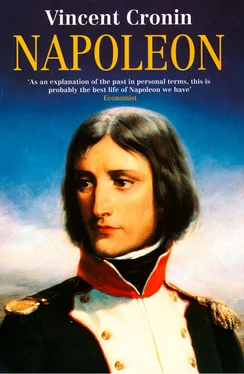Vincent Cronin - Napoleon
Здесь есть возможность читать онлайн «Vincent Cronin - Napoleon» — ознакомительный отрывок электронной книги совершенно бесплатно, а после прочтения отрывка купить полную версию. В некоторых случаях можно слушать аудио, скачать через торрент в формате fb2 и присутствует краткое содержание. Жанр: unrecognised, на английском языке. Описание произведения, (предисловие) а так же отзывы посетителей доступны на портале библиотеки ЛибКат.
- Название:Napoleon
- Автор:
- Жанр:
- Год:неизвестен
- ISBN:нет данных
- Рейтинг книги:3 / 5. Голосов: 1
-
Избранное:Добавить в избранное
- Отзывы:
-
Ваша оценка:
- 60
- 1
- 2
- 3
- 4
- 5
Napoleon: краткое содержание, описание и аннотация
Предлагаем к чтению аннотацию, описание, краткое содержание или предисловие (зависит от того, что написал сам автор книги «Napoleon»). Если вы не нашли необходимую информацию о книге — напишите в комментариях, мы постараемся отыскать её.
Napoleon — читать онлайн ознакомительный отрывок
Ниже представлен текст книги, разбитый по страницам. Система сохранения места последней прочитанной страницы, позволяет с удобством читать онлайн бесплатно книгу «Napoleon», без необходимости каждый раз заново искать на чём Вы остановились. Поставьте закладку, и сможете в любой момент перейти на страницу, на которой закончили чтение.
Интервал:
Закладка:
Life was much more like real army life. It pleased Napoleon that lights-out and reveille were signalled by the beating of drums, and the atmosphere was that of ‘a garrison town’. In winter the 150 cadets, graduates from the twelve provincial academies, took part in attacking and defending Fort Timbrune, a reduced but exact facsimile of a fortified town. Napoleon, because of his wish to join the navy, was placed in the artillery class, where he studied hydrostatics, and differential and integral calculus.
One day Napoleon was on the parade ground, drilling with his long unwieldy musket. He made a mistake, whereupon the senior cadet, who was instructing him, gave him a sharp rap over the knuckles. This was contrary to regulations. In a fury Napoleon threw his musket at the senior cadet’s head – never again, he swore, would he receive lessons from him. His superiors, seeing that they would have to handle this new cadet carefully, gave him another instructor, Alexandre des Mazis. Napoleon and Alexandre, who was one year ahead of him, at once struck up a lasting friendship.
The effeminate Laugier de Bellecour, once in Paris, definitely threw in his lot with the ‘queers’, indeed at one point the school authorities were so disgusted that they decided to send him back to Brienne, but were overruled by the Minister. When Laugier tried to renew relations Napoleon replied, ‘Monsieur, you have scorned my advice, and so you have renounced my friendship. Never speak to me again.’ Laugier was furious. Later he came on Napoleon from behind and pushed him down. Napoleon got up, ran after him, caught him by the collar and threw him to the floor. In falling Laugier hit his head against a stove, and the captain on duty rushed up to administer punishment. ‘I was insulted,’ Napoleon explained, ‘and I took my revenge. There’s nothing more to be said.’ And he calmly walked off.
Napoleon was evidently upset by Laugier’s relapse, which he linked with the luxury of his new surroundings. He sat down and wrote the Minister of War a ‘memorandum on the education of Spartan youth’, whose example he suggested should be followed in French academies. He sent a draft to Father Berton, but was advised by him to drop the whole affair, so his curious essay never reached its destination. This small episode is, however, important in two ways. As he later told a friend, Napoleon quite often felt physical attraction for men; it was because he had personal experience of homosexual urges that he was so eager to see them damped down. The other aspect of his essay is that it shows Napoleon for the first time sensing a national malaise. The malaise was real, but only a few, chiefly artists, sensed it. 1785, the year Napoleon wrote, was the year of the Diamond Necklace scandal, and the year when Louis David, reacting against the malaise, painted Le Serment des Horaces , in which after sixty years of lolling on beds and swings and scented cushions, the figures in French art suddenly snap to attention.
Napoleon spent his leisure moments, says Alexandre des Mazis, striding through the school, arms folded, head lowered – a posture for which he was criticized on parade. He thought often of his unsophisticated homeland and of exiled Paoli, who had modelled the Corsican constitution on Sparta’s. One of his friends made a funny drawing of Napoleon walking with long steps, a little Paoli hanging on to the knot at the back of his hair, with the caption, ‘Bonaparte, run, fly, to the help of Paoli and rescue him from his enemies.’
In the month after Napoleon entered the Ecole Militaire, his father came to the south of France to seek medical advice. He suffered from almost continual pain in the stomach, and a diet of pears prescribed in Paris by no less a man than Marie Antoinette’s physician had brought him no relief. At Aix he consulted Professor Turnatori, then went on to Montpellier, which had a famous medical faculty specializing in herbal remedies. Here he saw three more doctors, but they could do nothing to cure his pain or the vomiting which they described as ‘persistent, stubborn and hereditary’. Carlo had never been very religious but now he insisted on seeing a priest and during his last days he was comforted and given the sacraments by the vicar of the church of Saint-Denis. At the end of February 1785 he died of cancer of the stomach.
Napoleon, who had loved and respected his father, certainly experienced a deep sense of loss. He was particularly saddened that Carlo should have died away from Corsica amid ‘the indifference’ of a strange town. But when the chaplain wished to take him for a few hours to the solitude of the infirmary, as the custom was, Napoleon declined, saying that he was strong enough to bear the news. He wrote at once to his mother – Joseph was going home to look after her – but his letter, like all cadets’ letters, was re-styled by an officer, and ended up a formal, rather stilted exercise in filial consolation. A better sign of his feelings is that when a family friend in Paris offered to lend him some pocket money, ‘My mother has too many expenses already,’ Napoleon said. ‘I mustn’t add to them.’
Paris, moreover, sometimes provided free amusements. One day in March 1785 Napoleon and Alexandre des Mazis went to the Champ de Mars to watch Blanchard prepare to ascend in a hot-air balloon. Ever since the Montgolfier brothers had seen a shirt drying and billowing in front of a fire and so conceived the principle of ballooning, this sport had caught the public’s fancy. For some reason Blanchard kept delaying his ascent. The hours passed and no balloon rose into the air. Napoleon grew impatient: it was one of his traits that he could not bear to hang around doing nothing. Suddenly he stepped forward, drew a knife from his pocket and cut the retaining cords. At once the balloon rose into the air, drifted over the Paris rooftops and was later found far away, deflated. For this escapade, says Alexandre, Napoleon was severely punished.
Napoleon worked hard at the Ecole Militaire. He continued to do very well in mathematics and geography. He liked fencing and was noted for the number of foils he broke. He was very poor at sketching plans of fortifications, at drawing and again, at dancing, and so hopeless at German that he was usually dispensed from attending classes. Instead he read Montesquieu, the leading panegyrist of the Roman Republic.
Normally a cadet spent two years at the Ecole Militaire, especially when following the difficult artillery course. But Napoleon did so well in his exams that he passed out after only one year. He came forty-second in the list of fifty-eight who received commissions, but most of the others had spent several years in the school. More significant is the fact that only three were younger than Napoleon. His commission being antedated to 1 September, Napoleon became an officer at the age of sixteen years and fifteen days.
In 1785 there was no intake of officers into the navy, so Napoleon did not realize his ambition to be a sailor. Instead he was commissioned in the artillery: an obvious choice, given his flair for mathematics. He was handed his commission, signed personally by Louis XVI, and at the passing-out parade received his insignia: a silver neck-buckle, a polished leather belt and a sword.
On free days Napoleon sometimes visited the Permon family. Madame Permon was a Corsican, knew the Buonapartes, and had been kind to Carlo in the south of France; married to a rich army commissary, she had two daughters, Cécile and Laure. Napoleon put on his new officer’s boots and insignia and proudly went round to the Permon house at 13 Place de Conti. But the two sisters burst out laughing at the sight of his thin legs lost in his long officer’s boots. When Napoleon showed some annoyance, Cécile reproved him. ‘Now you have your officer’s sword you must protect the ladies and be pleased that they tease you.’
Читать дальшеИнтервал:
Закладка:
Похожие книги на «Napoleon»
Представляем Вашему вниманию похожие книги на «Napoleon» списком для выбора. Мы отобрали схожую по названию и смыслу литературу в надежде предоставить читателям больше вариантов отыскать новые, интересные, ещё непрочитанные произведения.
Обсуждение, отзывы о книге «Napoleon» и просто собственные мнения читателей. Оставьте ваши комментарии, напишите, что Вы думаете о произведении, его смысле или главных героях. Укажите что конкретно понравилось, а что нет, и почему Вы так считаете.












